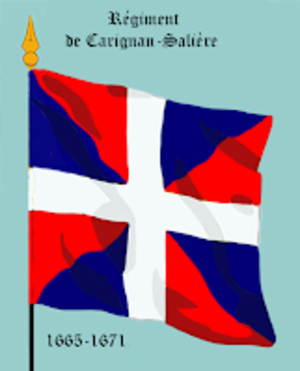Carignan-Salières Regiment
| Carignan-Salières Regiment | |
|---|---|

Carignan-Salières Flag
|
|
| Active | 1659 to 1794 |
| Allegiance |
|
| Type | Infantry |
| Role | Land combat |
| Colors | Red, blue, and white |
| Engagements | Throughout New France and Europe |
| Commanders | |
| Notable commanders |
Alexandre de Prouville, Sieur de Tracy, Daniel de Rémy de Courcelle, and Henri de Chastelard de Salières |
The Carignan-Salières Regiment was a Piedmont French military unit formed by merging two other regiments in 1659. They were led by the new Governor, Daniel de Rémy de Courcelles, and Lieutenant General Alexandre de Prouville, Sieur de Tracy. Approximately 1,200 men (Piedmont, Savoyard and Ligurian) arrived in the middle of 1665.
The Carignan-Salières was formed from two existing regiments: the Balthasar Regiment, formed during the Thirty Years' War and becoming the Salières when Balthasar died in 1665, and the Carignan Regiment, formed in 1644 in Piedmont. Following the Treaty of the Pyrenees in 1659, both regiments avoided disbandment by merging to form the Carignan-Salières Regiment.
In 1664, following the request of the Sovereign Council, the French finance minister Jean-Baptiste Colbert ordered the Carignan-Salières to reinforce the existing 100 man force in New France. This reinforcement was as much, if not more, motivated by mercantile ambitions than actual cries for help from New France. By now the regiment had been reduced to eight companies of about 400 troops; this was insufficient to meet King Louis XIV's demand for a large military force. The regiment's strength was increased to 20 companies and 1000 troops by absorbing 12 other French companies, including those from the Lallier, Chambellé, Poitou, and Broglio regiments. A popular erroneous story in New France was that the regiment had fought in the Austro-Turkish War of 1663–64; the story may have arisen from troops of the 12 new companies, many of whom may have fought in that war.
Four companies under Alexandre de Prouville joined the Carignan-Salières in New France from Martinique; de Prouville companies were attached to, but never formally integrated into, the Carignan-Salières.
...
Wikipedia
